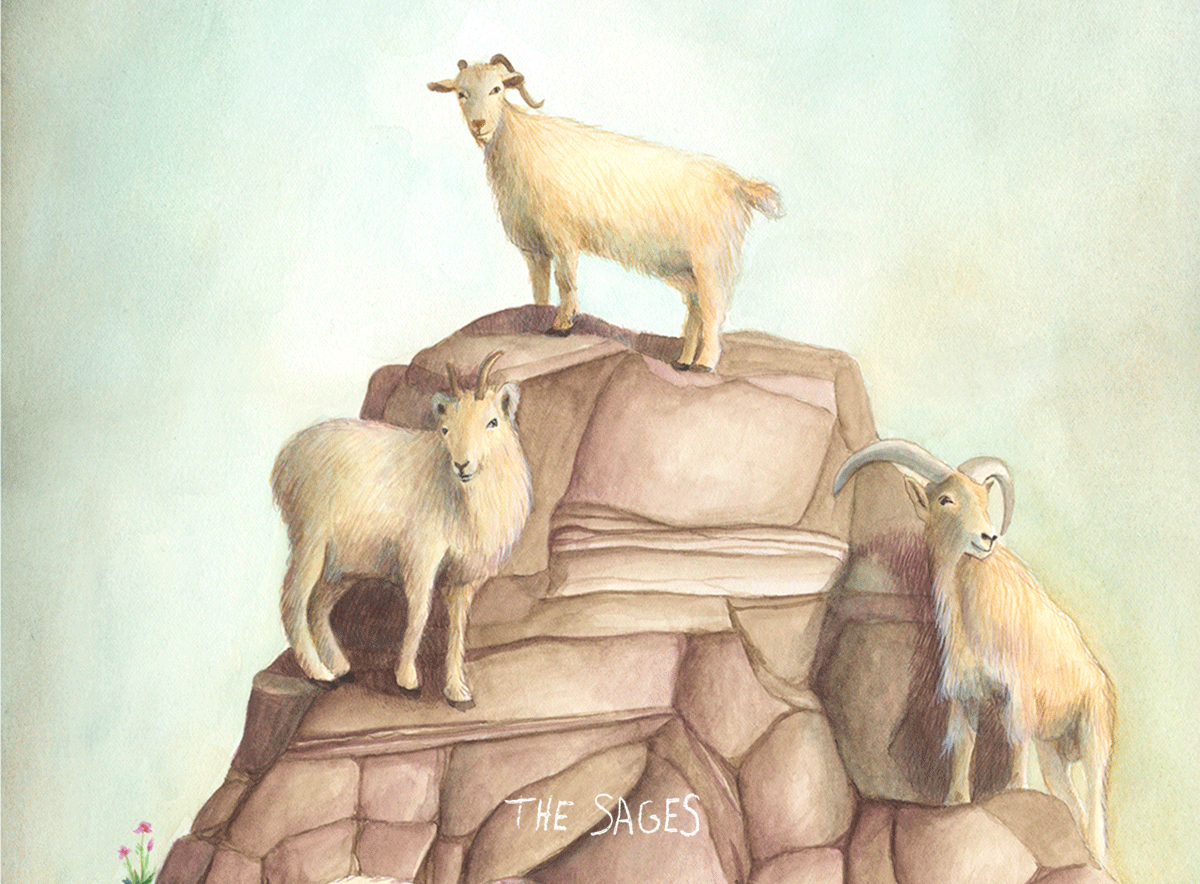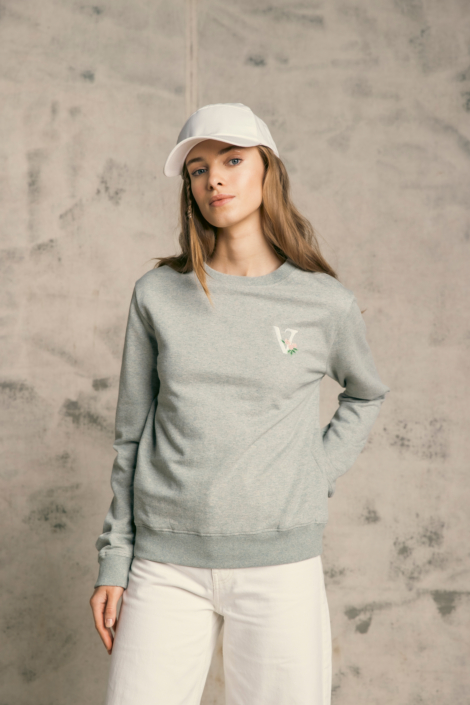FIND OUR FREEDOM: EXCLUSIVE INTERVIEW

In this exclusive interview, THE SAGES founder Iris Estival-David talks about the importance of becoming an eco-citizen and how ethical clothing will help move the world towards sustainable consumption.
Q: – How would you sum up your action plan in a few words?
Iris Anaëlle: - We have always created what we wanted and needed anytime and anywhere. Needs and desires precede manufacturing. Today, billions of tons of products are made and billions spent to persuade consumers to buy. I want to remind individuals that it is they who decide and that they must take back the power to act that was taken away by a system that thinks and decides for us. For it is the act of buying that determines what is made and how clothes are made, and each person is responsible for his/her present and future life.
Q: – Does being an eco-citizen and saving the planet necessarily involve banning animal products in clothing and fashion accessories?
Iris Anaëlle: - All the scientific studies affirm this. Of course, we cannot wait for consumer habits to change radically overnight. So, to be an eco-citizen the most important thing is to become aware that every purchase is significant because it is reproduced millions of times around the world.
Q: – Isn’t it more urgent to take care of exploited humans rather than animal exploitation?
Iris Anaëlle: - I have never understood why these two notions are opposed. Besides, we need to start somewhere. In both cases, the mental process is exactly the same, and this is evident in employee working conditions in slaughterhouses. Animal exploitation has a huge impact on the world, including: deforestation, water pollution, the wiping out of indigenous populations and the extinction of animal species, an increased incidence of certain diseases, and the destruction of biodiversity; and last but not least there is the problem of the fertility of humans, animals, and soils. All we have to do is change our consumption habits to prevent all of this.
Q: – Does being an eco-citizen mean removing all animal products from our wardrobes?
Iris Anaëlle: - The urgency of the current situation could cause some people to become dogmatic—it’s important not to go from one extreme to another. If you find a fur coat in the attic, which belonged to your grandmother, it makes sense to wear it. If not, the animals would have died for nothing, and we would buy something else, which would only increase consumption. On the other hand, considering that the animal was already dead when we bought a fur coat or a leather jacket at the store is an unethical pretext because if no one bought clothes made from animals, no one would make them either.
Q: – What would your ideal wardrobe contain?
Iris Anaëlle: - It would be a mix of different textiles. Linen and hemp are very eco-friendly, because they can be cultivated with rainwater alone and with few pesticides. It’s important to underline that the petrochemical industry produces phenomenal quantities of waste, and as we can neither stop nor prevent the pollution resulting from their elimination, buying clothes made from recycled materials is much more responsible. Finally, one can also buy clothing from second-hand shops, which avoids the incineration of unsold clothes, which is a pure waste of resources. In recent years, we have also seen the development of a new type of creative process, based on the immediate reuse of waste and production scraps that can be directly transformed into new accessories, without going through the phase of recycling materials: this is called upcycling. Recover an old tire, a fire hose at the end of its life, a used bicycle or truck inner tube, cut it up, assemble it and abracadabra, there you have a belt, suspenders, earrings or a new necklace.
Q: – Is that your definition of an eco-citizen?
Iris Anaëlle: - Yes, but there’s more to it. To begin with, we should only buy what we intend to wear. Buying responsibly is also a question of being informed and getting involved. We must become more aware of certain realities, because there are wholesalers which claim to be thrift stores or second-hand shops when they are actually selling marked-down new products made through slave labour, for the sole purpose of being sold at a low price. Many sites describe this dishonest commercial process that we should avoid at all costs. Another way to get involved is by encouraging people to think for themselves and say what is wrong. For example, every year many luxury brands are obliged to incinerate their stock, because if they didn’t do so they would have to pay taxes on their inventory. Can we accept a tax system that effectively promotes the destruction of resources and this level of wastefulness?
Q: – And what about green washing?
Iris Anaëlle: - I see this as the worst manipulation of this day and age, and the fact that it works shows how the human mind is easily deceived. But we don’t have to believe that a product is ethical because the name of the brand is written in green. Right from the outset, advertisements have always shown happy cows in pastures, or goats licking the hand of the shepherd, but in reality, the vast majority of farmed animals are artificially inseminated, raised in an intensive livestock production system, bunched together with no sunlight, and force fed with antibiotics and transgenic cereal, and they are slaughtered one after another. At every stage of their lives and even after their deaths the planet is being destroyed.
Q: – As for wool, it grows back again and the animals are free, so what’s the problem with using this material?
Iris Anaëlle - When I think of wool, I see a herd slowly crossing a road in Ireland, and I think that it’s a scene that many others imagine as well. This simply demonstrates the extent to which we are misinformed and conditioned by industrial groups. In fact, the vast majority of wool comes from intensive animal farming. Animals are raised in the spirit of profitability and they even have their genitals cut off to speed up the process.
It’s true that television also shows small tribes and villages whose main activity is raising herds of yaks or sheep, but since globalisation and the rise in demand for ethical products, nomads and natives have settled in order to make larger quantities intended for export. Hence, they follow manufacturing processes imported from the West, which are less and less ethical. The whole world is driving these small farmers to increase their production and profitability. As consumers, we only need to ask one question before buying: would my act of buying be sustainable on a large scale?
Q: – We know that the real problem comes from the massive increase of consumption in emerging countries. Couldn’t we prevent them from copying the Western model, which many qualify as suicidal?
Iris Anaëlle: - It is a knock-on effect and it’s even less controllable because the Western world designates itself as the model to follow. You only have to watch certain American series in which everyone is beautiful, rich, lives in a big house, has a big pool, and drives a fabulous car. If we want China to follow a good example, the best way to get there is to be an eco-citizen and set a good example, and not ask them to ‘do what we say and not do what we do’.
It’s also important to stop pointing out others’ shortcomings. This is a manipulative technique used by industrial groups to take away the responsibility from their customers and to ensure that consumers will carry on buying their products. In fact, it's the West that invented intensive farming to increase profits. At this time the Chinese diet mainly comprised rice, but now that is changing because they are influenced by the Western model. As Gandhi said: ‘If you cannot change yourself, how can you change the world’.
Q: – You say that the fact that fashion trends exist is in itself very harmful to humans and the planet, but what would your response be to those people who think that it’s a necessary part of progress?
Iris Anaëlle: - In 1980, the car models lasted at least ten years, which did not hinder the technical improvements made each year. These days, the car models change every year, to push sales. The car manufacturers do not take into account the excessive exploitation of humans, animals, and natural resources, nor the pollution that it produces, and so on. The same could be said of the fashion sector: every year the fashion industry imposes images in the media in order to valorise trends and colours. Little by little the population emulates this model imposed through this commercial approach, which could be referred to as planned psychological obsolescence.
All of this has no impact on reality, because it would absolutely not change anything whether we wear orange one year or purple the next. However, this system does reduce the lifespan of our clothes, and therefore destroys the ecology of the planet and impacts our purchasing power. In addition, fashion and society are not interested in the impact of their ‘diktats’ on the planet and many of the products cost significantly more in terms of negative repercussions than their contribution to humanity. This is part of the industrial process but I think it is impossible to call it progress.
Q: – Can you give an example of this?
Iris Anaëlle: - In the streets, at this very moment, some women are wearing long skirts, others short ones. The long ones require four to eight times as much fabric. The leather tanneries poison humans, fish, and water with chemical dumping. Certain colours are more polluting than others and rivers are dying due to the dumping of toxic dyes. Even white is almost always a chemical tint. In society, employees are implicitly expected to wear dark grey or black, which are very polluting colours, even though we have a natural inclination to wear a range of organic colours such as we see throughout nature.
Iris Anaëlle: - We are born naked and our ancestors were as well, but now there are written laws that state that we no longer have the right to be naked. We are obliged to hide our true selves underneath our clothes.
Certain professions are strictly regulated, which can easily be justified for the emergency services or the army, where a uniform is compulsory. For other professions, some rules are contractual, for example the uniforms of air stewards and stewardesses.
There are other unwritten laws regarding clothing: for example, in some offices, people would be astonished if a woman wore a bright yellow suit to work. This is an implicit order given to individuals, advising them to dress and consume in one way or another.
The most restrictive aspect of all this for me is the fact that we care more about other people’s judgments than our own. Certain women do not feel happy about wearing a bra, but they do it anyway because they’re worried that their sister or colleague at work might think it was ‘inappropriate’. What is more, studies indicate that wearing a bra multiplies the risk of breast cancer by 125%.
Q: – Could a simple solution be to promote a universal way of dressing?
Iris Anaëlle: - But this is pretty much what goes on when we dress in ready-to-wear clothing from the major brands! This egalitarian clothing principle exists in dictatorships. It also exists among certain people like the Kogis or the Arhuacos in Colombia, but only because they have limited supplies of raw materials. Today, all the major brands belong to the same industrial groups, and buying their products has three disadvantages: firstly, in doing so, we are promoting a political and economic system that goes against human and animal welfare; secondly, we have become physically and psychologically programed to dress in the same way; thirdly, we are destroying nature and the planet for future generations.
Humans need diversity because the planet needs it just as much. No human is exactly alike, no more than two tigers or two snowflakes. These days, the same brands are present in almost every city in the world. Everywhere you go people dress the same. We should be ready to buy ethical clothes we enjoy wearing and which have a lesser ecological impact, instead of merging into a mass of gullible consumers.
Q : – What role does ethical fashion play?
Iris Anaëlle: - For me, being fashionable is being as authentic as possible and following your own inspiration. It’s about respecting nature and preserving our future.
Another way to get involved is by encouraging people to think for themselves and say what is wrong.



Validate your login